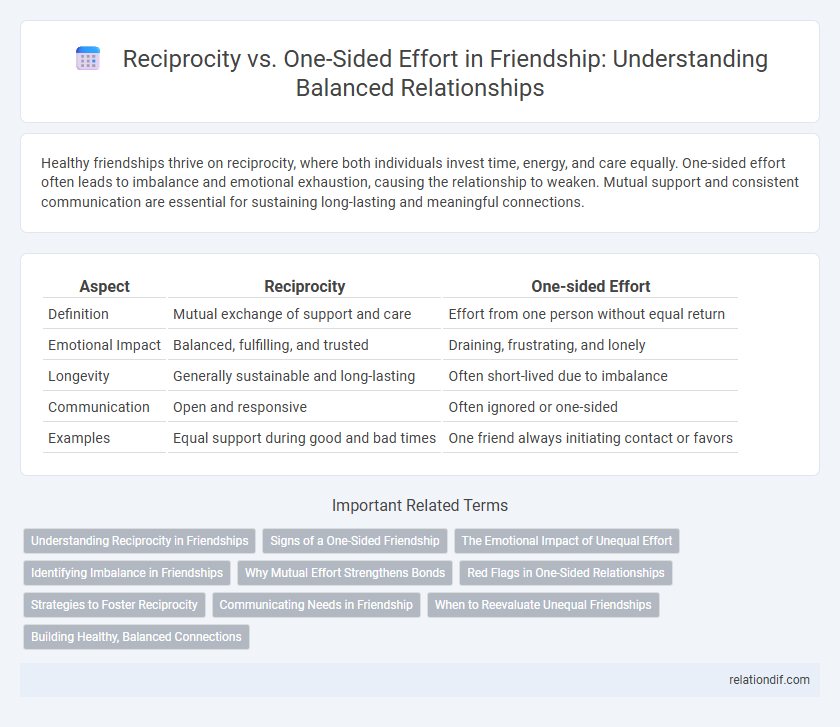Healthy friendships thrive on reciprocity, where both individuals invest time, energy, and care equally. One-sided effort often leads to imbalance and emotional exhaustion, causing the relationship to weaken. Mutual support and consistent communication are essential for sustaining long-lasting and meaningful connections.
Table of Comparison
| Aspect | Reciprocity | One-sided Effort |
|---|---|---|
| Definition | Mutual exchange of support and care | Effort from one person without equal return |
| Emotional Impact | Balanced, fulfilling, and trusted | Draining, frustrating, and lonely |
| Longevity | Generally sustainable and long-lasting | Often short-lived due to imbalance |
| Communication | Open and responsive | Often ignored or one-sided |
| Examples | Equal support during good and bad times | One friend always initiating contact or favors |
Understanding Reciprocity in Friendships
Understanding reciprocity in friendships involves recognizing the mutual exchange of support, empathy, and effort that sustains healthy relationships. Balanced interactions, where both individuals invest emotionally and practically, foster trust and deepen connections, while one-sided efforts may lead to imbalance and resentment. Monitoring the give-and-take dynamics helps ensure friendships remain nurturing and equitable over time.
Signs of a One-Sided Friendship
Signs of a one-sided friendship include consistently making plans without reciprocation, feeling emotionally drained after interactions, and noticing a lack of effort from the other person in maintaining communication. When one friend frequently initiates contact and support while the other remains passive or indifferent, the imbalance becomes clear. These patterns undermine trust and can lead to feelings of neglect and resentment, highlighting the importance of mutual effort for a healthy friendship.
The Emotional Impact of Unequal Effort
When one friend consistently invests more time and energy into the relationship, feelings of frustration and emotional exhaustion often arise, undermining trust and connection. Unequal effort can create a sense of neglect and devaluation, leading to resentment and decreased relationship satisfaction. Balancing reciprocity in friendship strengthens emotional bonds and fosters mutual support, promoting long-term relational health.
Identifying Imbalance in Friendships
Friendship thrives on reciprocity, where both parties contribute equally to emotional support and shared experiences. Identifying imbalance occurs when one person consistently invests time, effort, and care without receiving mutual engagement or appreciation. Recognizing these patterns helps maintain healthy relationships and prevents emotional exhaustion caused by one-sided effort.
Why Mutual Effort Strengthens Bonds
Mutual effort in friendship fosters trust and balance, creating a foundation where both parties feel valued and understood. When both friends invest time, support, and empathy, it reinforces emotional connection and resilience against conflicts. This reciprocity cultivates deeper bonds by ensuring that care and commitment flow in both directions, preventing feelings of neglect or imbalance.
Red Flags in One-Sided Relationships
A key red flag in one-sided friendships is consistently unreciprocated effort, where one person initiates contact, plans activities, and provides emotional support without meaningful returns. This imbalance often leads to feelings of exhaustion, neglect, and diminished trust, highlighting a lack of mutual respect and genuine care. Recognizing these signs is crucial for maintaining healthy, balanced relationships that foster genuine connection and personal well-being.
Strategies to Foster Reciprocity
Fostering reciprocity in friendships requires clear communication and mutual support to ensure both parties feel valued and engaged. Establishing shared goals and regularly expressing appreciation reinforces balanced effort and reduces feelings of imbalance. Consistent check-ins and responsiveness to each other's needs promote trust and sustain long-term relational reciprocity.
Communicating Needs in Friendship
Effective communication of needs in friendship fosters reciprocity, ensuring both parties feel valued and supported rather than drained by one-sided effort. Expressing boundaries and desires clearly helps prevent misunderstandings and nurtures mutual respect, which strengthens the emotional bond. Consistent dialogue about expectations allows friends to adjust their support, creating a balanced and enduring relationship.
When to Reevaluate Unequal Friendships
Unequal friendships marked by one-sided effort often signal the need for reevaluation when emotional support and mutual respect consistently fail to balance. Persistent neglect of reciprocity can lead to emotional exhaustion and decreased trust, undermining the foundation of genuine friendship. Recognizing these warning signs early helps maintain healthy boundaries and prioritizes relationships built on mutual care and effort.
Building Healthy, Balanced Connections
Balanced friendships thrive on reciprocity, where both parties contribute emotional support, time, and effort equally. One-sided effort often leads to imbalance, fostering feelings of resentment and emotional fatigue, which undermine the foundation of trust and mutual respect. Prioritizing open communication and shared responsibility strengthens healthy, enduring connections between friends.
Reciprocity vs One-sided Effort Infographic

 relationdif.com
relationdif.com